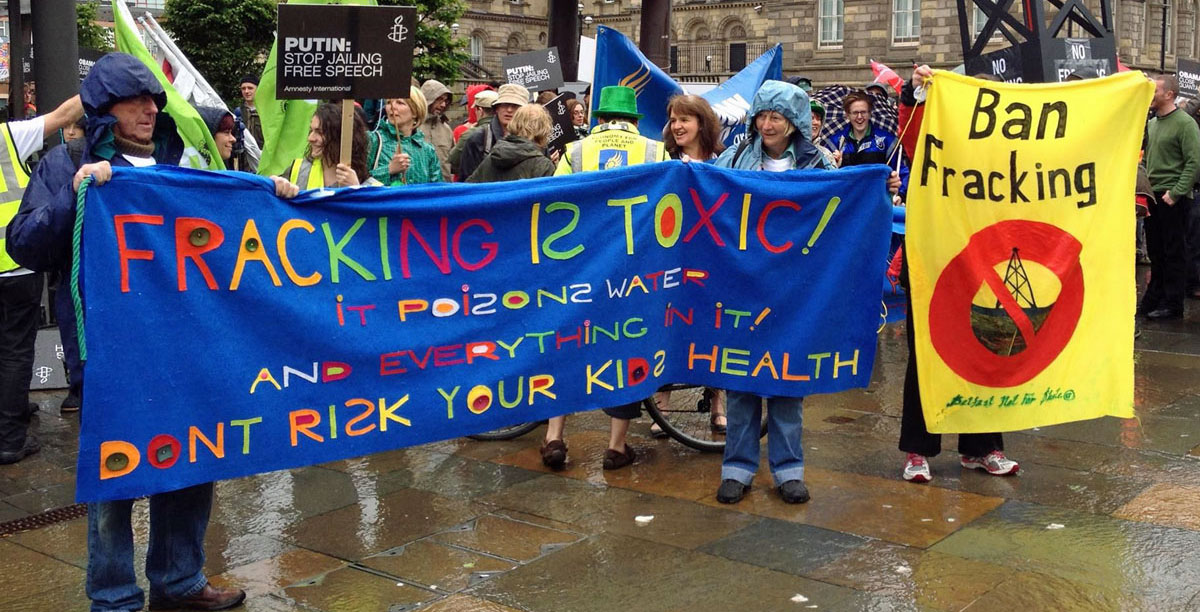Elli Kontorravdis, from Queen’s University Belfast Friends of the Earth Society, recently wrote this article on what fracking is, why we dont want it and what the alternatives should be, in the run up to the international day of action #GlobalFrackdown. This article first appeared in The Gown, the Queen’s University campus newspaper. Thanks Elli for sharing it with us too!
A non-technical description of hydraulic fracturing (fracking)
Companies, who are granted permission, drill thousands of large holes, pump millions of gallons of water, sand, and countless ‘trade secret’ chemicals into the ground so as to fracture shale rocks and release natural gas. There are many different types of wells, and differing methods of fracture, but for ease of explanation the aforementioned is the most common of the unconventional gas extraction methods.
Why don’t we want it
Because we care about water, air, land, health, business, and climate change.
There is a significant risk that well casing will leak and pollute local water supplies, as evidenced throughout America and Australia. The toxic water, both from the chemicals used in extraction and in combination with the gas retrieved, has disastrous effects on the health of the people and wildlife of that locale and beyond – water knows no borders; should a large river, say the size of the Shannon, become polluted, the toxins would travel the length of the island of Ireland. Even if the wells weren’t to leak, the water returned from the process requires energy intensive treatment, which, even so, has been shown to not necessarily remove all the hazardous substances.
Aside from the effects on water, fracking releases toxins into the air; the gas that cannot be captured either escapes or is flared. Gas flaring creates known carcinogenic by-products and contributes to greenhouse gas emissions, making it even more unlikely that the UK will meet the climate emission reduction targets it agreed to.
Exploratory wells are planned throughout the UK and Ireland, some as close as 200m from homes. As well as potentially polluting, frack pads greatly devalue the properties and the desirability of the land around them. In order to make extraction profitable a large number of wells are needed – for an area the size of Leitrim and Fermanagh 6,000 wells have been suggested. For an island whose greatest industries are tourism and agriculture the consequences hardly need stating.
Irrespective of what unconventional gas companies say about their strict compliance with regulation the European Commission has recognised that compliance alone cannot definitely prevent pollution because the method of extraction poses unavoidable risks.
The examples often referred to in the USA of more affordable energy have been found untenable here; the recent nine month cross-party parliamentary inquiry concluded that fracking is ‘unlikely to give the UK cheap gas’.
The minor short term anticipated economic benefits seem to be far outweighed by the costs to people, the environment, and the economy of repairing the damage done by fracking.
What are the alternatives
To put it as simply as possible the world can be completely powered by renewable energy by 2050 using technologies that already exist and at a similar cost to existing expenditure on energy. Northern Ireland alone produces enough wind potential to power these islands and export Europe; all we need is the political and social will.
This weekend, to mark Global Frackdown Day, hundreds of community groups around the world are getting together to take action on 19th October. These events are being organised to challenge decision makers to oppose fracking, united around a common mission statement calling for a ban on fracking and investment in a clean energy future.
If you would like to take part in this, or to find an event in your country, visit www.globalfrackdown.org/events/
Reclaim Power: Global Month of Action on Energy
#GlobalFrackdown takes place in week one of Reclaim Power- a whole month of action around the world, to say NO to dirty and harmful energy! and YES to renewable energy for people and communities! Find out more and get involved in Reclaim Power.

